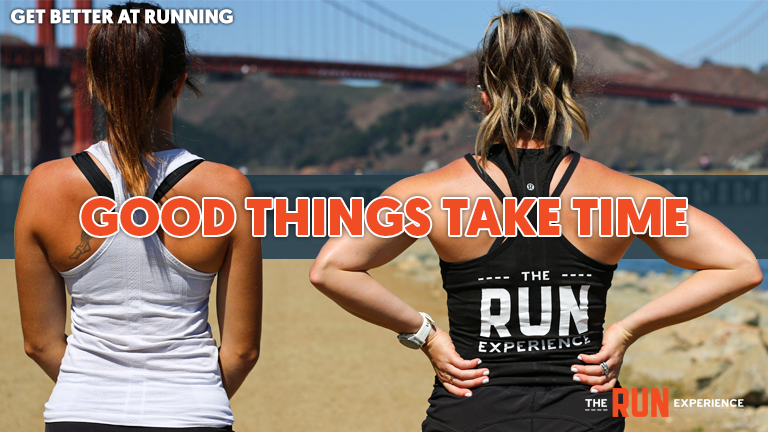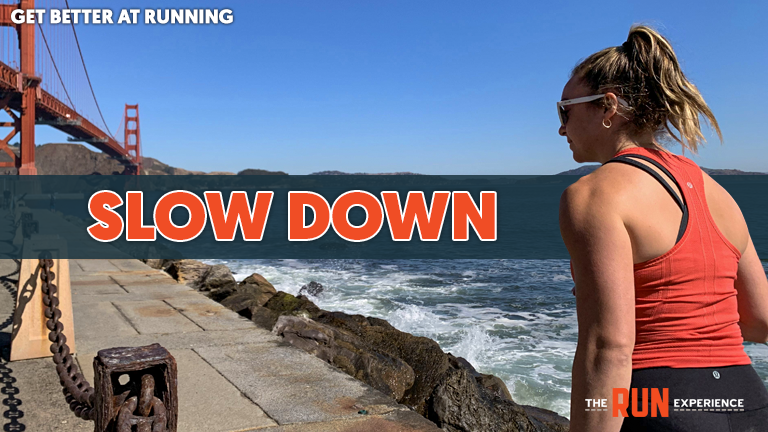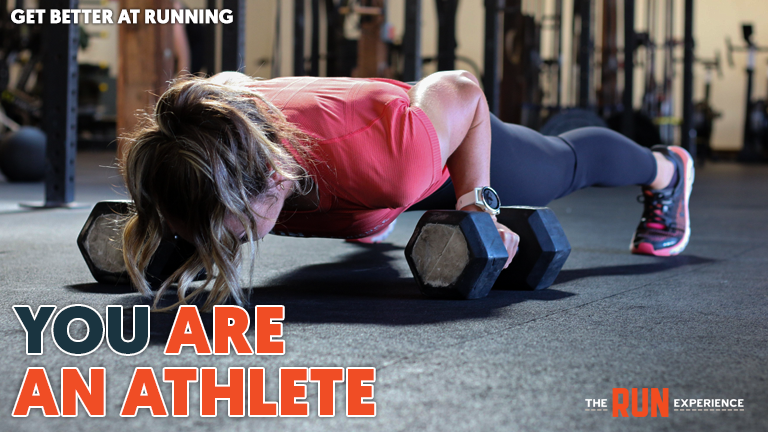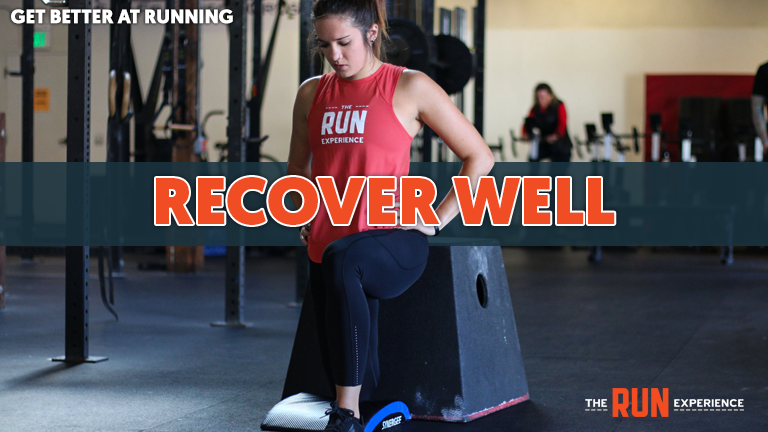How to Get Better at Running—Become a Better Runner
Discover how to get better at running and learn to love the journey. Learn how to become a better runner with 5 must-know tips.

Wondering how to be a better runner?
Right now, loving (let alone liking) running may seem next to impossible. How could you possibly enjoy the heavy breathing, itchy legs, sweating, and general feeling like you could drop dead at any moment…all for voluntarily long periods of time?
Today, the secret is out. In this article, we’ve got 5 tips to kickstart your journey and show you how to become a better runner.
We’ll show you how to get better at running—and there’s a good chance you’ll come to love it along the way.
How to Become a Better Runner
If you’ve tried to enjoy running before, start by scratching any memory of that experience from your mind.
Focus instead on the fact that you, for whatever reason, came back to try this again. You clearly care about running or at least reaping the benefits of it. How you get better at running is ultimately tied to your purpose—one runner might choose to get better for races, and another might get better to lose weight. There’s no right or wrong answer.
Let’s first compare your training for race day, weight loss goal, or whatever else you’re trying to accomplish, to the reading of this article.
You’re bound to want to skim through at some point because you need the facts, not the fluff. I challenge you to instead, stay present as you read this article and use it as a ‘practice run’ for the training ahead.
1. Have the Patience to Get Better at Running

A good training program will include a blend of strength training, mobility exercises, speed workouts, running technique work, all types of interval training, and running (eventually) long distances.
The beauty of this kind of mash-up is that every day feels new and specific. Seeing a calendar full of different activities and daily goals is a lot more exciting than seeing that you “have to run” three miles every day for the next 30 days.
Let’s back up for a second.
Any ‘good’ training program is one that was created out of someone’s careful thought and planning. So, if you look ahead to the Saturday of week 4 and see you’re supposed to run 6 miles (which you’ve never in your life done), you can trust the fact that everything on the calendar leading up to that will prepare you to be ready for your first 6-mile run.
Don’t let the finish line pull focus away from the day-to-day. Trust the process…it was designed to work.
2. Slow Down to Become a Better Run

The biggest killer of progress is comparison.
Again, erase any past relationships you’ve had with running – being forced through the mile run at school, running as fast as you can just to miss the bus, rolling an ankle chasing after the dog – from your mind.
Most peoples’ early experience with running involves maxed out speed, or running somewhere to meet a deadline.
This time, you’re building your running to last.
By slowing down your pace, you can lower your heart rate, make breathing feel easier and more comfortable for longer runs. Who knows, you might even be able to hold a conversation with a buddy!
- Best suggestion: Take smaller steps and wear a watch or use an app that tracks pace so you can see if you’re pushing too hard in the beginning. In the first few weeks of training, run for time, not mileage.
3. Treat Yourself Like an Athlete to Become a Better Runner

…because you are one!
Running supported by strength training and cross-training is a lot more likely to last. Strength and agility work will make you a more efficient runner. They also serve as a second line of defense against poor habits that eventually create injury.
Bodyweight strength training exercises like push-ups, lunges, burpees, and squats can develop strength in an exaggerated version of the range of motion used when you run. In other words, building strength along the edges of your run form (via the movements listed above) will make running itself feel easier.
For a closer look at some bodyweight exercises as they compare to weight training, check out this article.
Having more tools in your toolbox will again lower your injury risk and make you well rounded in anything physical you do, whether that’s yard work, hauling groceries, or playing with your dog.
You’d be naive in this day and age to think that great runners “just run.”
- Best Suggestion: Regardless of the distance or goal you’ve decided to train for (half marathon, 5K, ultramarathon, 10K), you should add a minimum of 2 strength sessions into your weekly training. These workouts could be as short as 15 minutes but collectively should work the full body in ways that you can measure and improve upon over time. Example: Make it a weekly habit to test the number of quality push-ups or “hollow rocks” you can complete in 2 minutes. Here’s an easy way to do that.
4. Prioritize Your Recovery to Get Better at Running

Your recovery time is crucial for improving your ability and strength as a runner.
Your workouts are essentially just methods for breaking down muscle fibers. Each new stress (in this case, the good kind!) that we place on the body causes muscle fibers to micro-tear as they’re being worked.
The good news is that your body repairs the tears in the days following, and ultimately you come back with more resilience to that type of stress, thus becoming stronger over time.
While our body generally knows how to repair itself, a focused plan for restoration after the workout will pay off big time!
It’s up to us to prioritize this recovery and ultimately lessen the time it takes to be ready for another hard workout. The New York Times did a great article on all this here.
If you still want to be active on one of your rest days, you’ve got options! Check out this list of 11 activities to do on your recovery day.
Get some sleep!
Sleep is the best way to recover. If you’re getting proper amounts of sleep (I’d suggest 7 hours minimum), you’ll be a lot quicker to recover from tough workouts. Plus, you’ll be ready to hit the next one sooner and harder, thus improving your overall fitness one day at a time.
One of the best side effects of increased training is having no problem falling asleep! Putting your body to work will have it ready and willing for a good night’s rest.
If you struggle with this one, you’re not alone. To help, check out these tips to sleep better.
Stretch it out!
Another favorite way to bring the sore, tired body back to life is by mobilizing and stretching regularly. Again, you’re taking your body to new limits daily – be it in the form of a slightly longer jog, 30 lunges instead of 20, or running your fastest mile ever on the treadmill.
If you aren’t giving some love to the hamstrings, lower back, calves, quads, etc a couple of times a week, you can’t expect them to keep putting in work.
- Best Suggestion: Allot time in every workout to foam rolling, soft tissue work with a lacrosse ball, and regular warm ups and cool downs. Even 5 minutes a day will do the trick. Maintain the machine before it breaks down!
5. Find Friends Who Want to Become Good Runners

My guess is that your previous running goals got derailed when enough “unmotivated” moments added up and convinced you that you’d bitten off more than you could chew.
Remember that the “lows” aren’t indicators of failure ahead. Rather they are a very normal part of the otherwise incredible journey to get you to the finish line (figurative or literal).
Keep this in mind, and you’ll be a lot less fazed when they come up and better able to stay on track.
This can’t be a solo journey.
Sure, you’ll be the one responsible for getting up and out on a cold, dark morning. And you’ll be the one who has to stay on top of the extra laundry piling up from a week’s worth of workouts.
But you don’t have to be the only one responsible for digging yourself out of the days when you don’t feel like doing either of those things. Even the best runners in the world don’t wake up with 100% motivation every day.
Handling those moments to the best of your ability, with an added support system in the form of a run club or online beginner running group, will be the key in moving you forward.
Groups of people going through exactly the same things you are, at the exact same time, hold a special sort of power.
Seeing a photo of someone else in the group who also didn’t feel like running that morning, post-run looking sweaty and proud will definitely get you motivated to get up and get your s**t done.
If your knee hurts or you’re feeling something funky after your run, post something in the group and ask for help. My guess is that most of the people in there have gone through something similar and can share a running tip or two.
- Best Suggestion: Download The Run Experience mobile app and gain access to the largest community of beginner runners, going through exactly the same things you are. Lean on them, run with them, and share every small victory with people who care!
6. Focus on Nutrition to Become a Better Runner
Fueling your body properly is a crucial aspect of improving your running performance. What you eat before, during, and after your runs can significantly impact your energy levels, endurance, and recovery.
- Pre-Run Nutrition: Aim to eat a balanced meal with carbohydrates, protein, and healthy fats 2-3 hours before your run. If you're running in the morning, a light snack like a banana or a piece of toast with peanut butter 30-60 minutes before can provide a quick energy boost.
- Hydration: Staying hydrated is essential. Drink water throughout the day, and consider having a sports drink or electrolyte solution during longer runs to replenish lost minerals.
- Post-Run Recovery: After your run, refuel with a combination of carbohydrates and protein to help your muscles recover. Foods like chocolate milk, a smoothie, or a turkey sandwich can be excellent post-run options.
Best Suggestion: Keep a food diary to track what you eat and how it affects your runs. This will help you identify what works best for your body and optimize your nutrition plan accordingly.
7. Incorporate Cross-Training to Become a Better Runner
While running is your main focus, incorporating other forms of exercise can help you become a more well-rounded athlete and prevent overuse injuries. Cross-training can improve your overall fitness, strengthen different muscle groups, and give your running muscles a break.
Types of Cross-Training:
- Cycling: Great for building leg strength and endurance without the impact on your joints.
- Swimming: Provides a full-body workout and is excellent for improving cardiovascular fitness.
- Yoga: Helps improve flexibility, balance, and mental focus.
- Strength Training: Enhances muscle strength and stability, which can improve your running form and efficiency.
Best Suggestion: Aim to include at least one or two cross-training sessions per week. This will keep your workouts varied and exciting while enhancing your overall fitness and running performance.
8. Pay Attention to Running Form to Become a Better Runner
Proper running form is essential for efficiency and injury prevention. By focusing on your running technique, you can run faster, longer, and with less effort.
Running Form Tips:
- Head and Shoulders: Keep your head up and shoulders relaxed. Look ahead, not down at your feet.
- Arms: Swing your arms naturally at your sides, with a 90-degree bend at the elbows. Avoid crossing them over your body.
- Core: Engage your core muscles to maintain a stable and upright posture.
- Hips: Keep your hips aligned with your body, avoiding excessive forward or backward tilt.
- Legs and Feet: Aim for a midfoot strike, landing softly and rolling through to push off with your toes. Maintain a quick, light stride rather than overstriding.
Best Suggestion: Consider working with a running coach or recording yourself running to analyze your form. Regularly practicing form drills, such as high knees, butt kicks, and skips, can also help reinforce good running mechanics.
How to Get Good at Running?
First, let’s define “good.” Everyone’s running ability and goals are different. For some, finishing a 5K is going to be a huge accomplishment, while others will be hunting down a 100-mile race. Furthermore, some athletes don’t want to just finish—they want to compete for the win.
Neither athlete is better than the other—they just have different goals. Before you can learn how to get good at running, you need to define what good is for you.
What’s your goal? What does success look like?
Once you have that vision in mind, you can tailor your running plan to make it happen.
How to Enjoy Running
One of the aspects of becoming a better runner is learning to enjoy running. Yes, that's right—it needs to become something you look forward to, something you (preferably) don't want to live without.
The journey to enjoying running looks different for everyone, but it's definitely something you can learn—you don't need to be born with it. Here are a few tips to help you learn how to enjoy running:
- Start Slowly: If you're new to running or returning after a hiatus, it's essential to start at a comfortable pace and distance. Overexerting yourself early on can lead to discomfort, injury, or burnout.
- Set Achievable Goals: Whether it's running for a certain amount of time, covering a specific distance, or participating in a local race, setting goals can provide motivation and a sense of accomplishment.
- Mix Up Your Routine: Vary your routes, incorporate interval training, or try trail running. Different environments and challenges can keep your runs fresh and exciting.
- Listen to Music or Podcasts: A good playlist or an engaging podcast can make the time fly and give you something to look forward to on your runs.
- Join a Running Group: Running with others can provide companionship, motivation, and accountability. Plus, it's a great way to make new friends.
- Invest in Good Gear: Comfortable shoes and clothing can make a significant difference in your running experience. Ensure you have shoes that fit well and are suitable for your running style.
- Participate in Races: Even if you're not competitive, races offer a festive atmosphere, camaraderie, and a sense of achievement.
- Track Your Progress: Using apps or journals to log your runs can be satisfying and allows you to see your improvements over time.
Become a Better Runner
Believe in yourself! The self-confidence you’ll build from following through will make you untouchable. Take things one day at a time and don’t give in to the moments you feel like quitting.
Remember: those are 100% normal and will always give way to the most coveted moments of breakthrough if you let them. You are a runner!
If you struggle with self-confidence, understand that self-confidence requires trusting yourself. And trust is something you can build. If you want to learn more about trusting yourself, check out these tips.
Now that you know how to get better at running, it’s time to make it happen. Don’t just read and carry on with your day—make a plan. You know how to become a better runner—now go do it.
